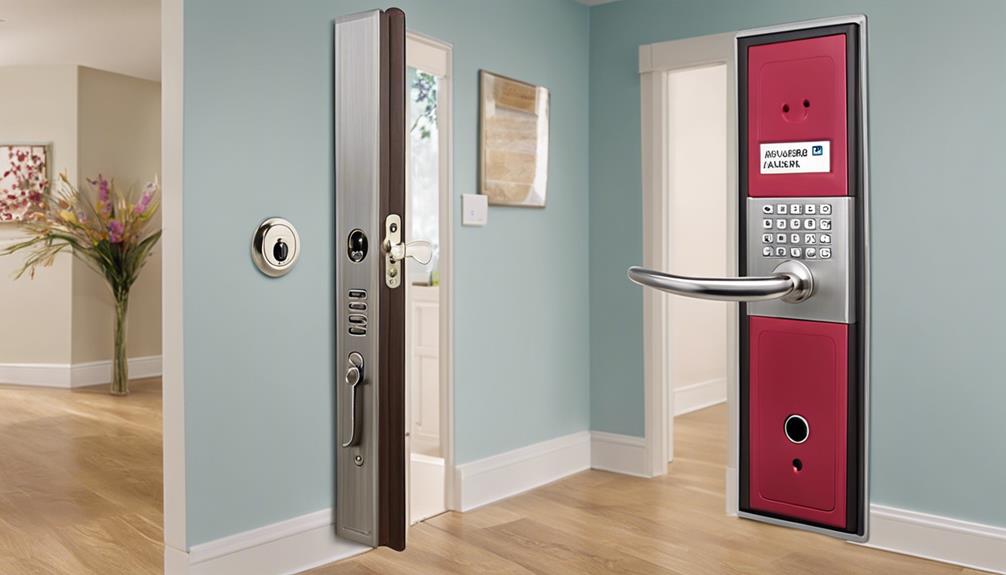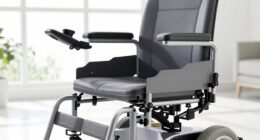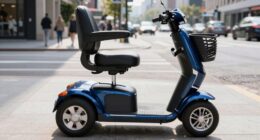Door locks designed specifically for individuals with dementia are crucial for maintaining safety and preventing wandering incidents.
The specialized design of these locks offers a sense of security for both caregivers and family members.
However, the discussion doesn't end there; exploring the various types and benefits of these door locks can shed light on the significant impact they have on the well-being of individuals with dementia.
Key Takeaways
- Keyless entry systems and biometric locks enhance security and convenience.
- Magnetic locks and door alarms provide added safety and peace of mind.
- Time-delay features offer controlled access for dementia patients.
- Consider additional home safety options like GPS tracking watches and medical alert pendants.
Types of Specialized Door Locks
When caring for dementia patients, utilizing specialized door locks can greatly enhance their safety and security within their living environment. These locks offer various features tailored to the unique needs of individuals with dementia.
Keyless entry systems with codes or cards provide easy access for patients who may struggle with traditional keys. Biometric door locks, utilizing fingerprints or voice recognition, offer secure entry options, ensuring only authorized individuals can enter.
Magnetic locks automatically engage when the door closes, providing convenience and safety for dementia patients who may forget to lock doors. Door alarms are another essential device, alerting caregivers of any attempted exits and enhancing the overall security of the living space.
Additionally, locks with time-delay features help prevent accidental lock-ins, adding an extra layer of safety for dementia patients. Caregivers play a crucial role in selecting and implementing these specialized door locks to create a secure and supportive environment for individuals with Alzheimer's or dementia.
Benefits of Dementia Door Locks

Specialized door locks for dementia patients offer a range of benefits, ensuring enhanced security and peace of mind for both caregivers and family members. One such Alzheimer's door lock is the Guardian Confounding Lock, a clever senior security device that works effectively as an Alzheimers safety device. These locks provide an effective means of hindering wandering incidents among dementia patients, adding an extra layer of security to their surroundings. The Confounding Door Lock features an unusual appearance and location, making it challenging for patients to figure out, thus reducing the risk of accidents and promoting safety. Additionally, these locks are easy to install, offering caregivers and family members the convenience they need to control access to certain areas. Incorporating Smart Sole Tracking technology, dementia door locks not only enhance security but also contribute to the overall quality of life for both patients and their loved ones.
| Benefits | Description |
|---|---|
| Enhanced Security | Alzheimer's door locks provide a layer of security, hindering wandering incidents among patients. |
| Peace of Mind | Clever senior security devices like the Guardian Confounding Lock offer peace of mind to caregivers. |
| Controlled Access | These locks facilitate controlled access to certain areas, ensuring safety for dementia patients. |
Top-Rated Door Locks for Dementia Patients
As we explore the realm of top-rated door locks for dementia patients, let's delve into innovative solutions that prioritize both security and ease of use.
When considering a strong Alzheimer's door lock, one can find keyless entry systems with codes or cards, offering easy operation and secure design. Biometric door locks using fingerprints or voice recognition are another excellent option, providing advanced security features that are both user-friendly and reliable.
For exit doors, magnetic locks that automatically engage when the door closes are exceptionally high in terms of preventing unauthorized exits. These locks not only deny access for people with dementia but also ensure their safety.
Caregivers can expect added peace of mind with door alarms that alert them of attempted exits, while time-delay features in locks help prevent accidental lock-ins, enhancing overall safety for individuals with dementia.
When installed discreetly, these locks blend into the appearance and unusual location, offering a seamless security solution for dementia patients.
Key Features to Consider

Considering the unique needs of dementia patients, prioritizing key features in door locks becomes crucial for ensuring their safety and well-being. When selecting door locks for individuals with dementia, it's essential to keep in mind specific characteristics that can enhance both security and ease of use.
Here are some key features to consider:
- Keyless Entry Systems: Install keyless entry systems that use codes or cards to eliminate the need for physical keys, reducing the risk of misplacement or confusion.
- Biometric Technology: Utilize biometric door locks that employ fingerprints or voice recognition for secure and convenient access, especially beneficial for those who may struggle with traditional keys.
- Magnetic Locks: Opt for magnetic locks that automatically engage when the door closes, ensuring that the door remains securely locked at all times.
- Door Alarms: Incorporate door alarms to alert caregivers to any attempted exits, providing an additional layer of safety and supervision.
- Time-Delay Features: Consider locks with time-delay features to prevent accidental lock-ins and offer peace of mind by delaying the locking mechanism, allowing for safe and controlled access.
Other Options for Home Safety
To further enhance home safety for dementia patients, exploring additional options beyond door locks can provide added layers of security and peace of mind. GPS tracking watches are a valuable tool in preventing wandering incidents, offering caregivers real-time location information.
Door stop signs can discourage access to certain areas, while wandering alert door or motion alarm kits add extra security measures. Consider using 'Do Not Enter' signs to deter dementia patients from restricted areas, supplementing traditional door locks.
Mobile medical alert pendants like Belle offer a way for dementia patients to call for help when needed, promoting safety reasons. For in-swinging doors, door-jamming blockers with an unusual appearance can delay access, giving caregivers time to intervene.
These solutions, when strategically implemented, cater to the specific needs of dementia patients and caregivers, promoting a secure home environment. Remember, it's vital to install tracking watches properly and ensure the door safety mechanisms are suitable for the door material, especially when dealing with wooden doors.
Frequently Asked Questions
How Do You Secure a Door for Dementia Patients?
We secure doors for dementia patients by exploring keyless entry systems, biometric locks, magnetic locks, door alarms, and time-delay features. These options enhance safety and provide peace of mind for caregivers.
Our focus is on creating a secure environment that's easy to navigate for individuals with dementia. By incorporating these solutions, we aim to offer a sense of security and independence to those we care for.
What Is the Best Lock for People With Dementia?
When it comes to the best lock for people with dementia, we've got you covered.
From keyless entry systems to biometric locks, we've options that prioritize ease of use and security.
Whether it's fingerprint recognition or time-delay features, our solutions are designed to keep your loved ones safe and sound.
Let's help you find the perfect lock that fits your needs and gives you peace of mind.
What Are 3 Things to Never Do With Your Loved One With Dementia?
When caring for a loved one with dementia, there are three crucial things to remember:
- Avoid arguing or correcting them, as it can cause frustration.
- Never leave them unsupervised near risky areas.
- Refrain from rushing or pressuring them, as it can lead to agitation.
These actions help maintain their comfort and security. It's essential to approach their care with patience and understanding, ensuring their well-being and our own.
How Do You Stop Someone With Dementia From Leaving the House?
To stop someone with dementia from leaving the house, we can utilize strategies like redirecting their attention, creating a safe and engaging environment indoors, and using gentle reminders about the reasons to stay inside.
It's crucial to approach the situation with compassion and understanding, prioritizing their safety while respecting their independence as much as possible.
Conclusion
In conclusion, specialized door locks for dementia patients are like guardian angels, silently watching over and protecting our loved ones.
With their secure design and easy operation, these locks offer a sense of security and peace of mind to caregivers and family members.
By integrating them into our homes, we create a safe and comforting environment where individuals with dementia can thrive and be kept safe from harm.








